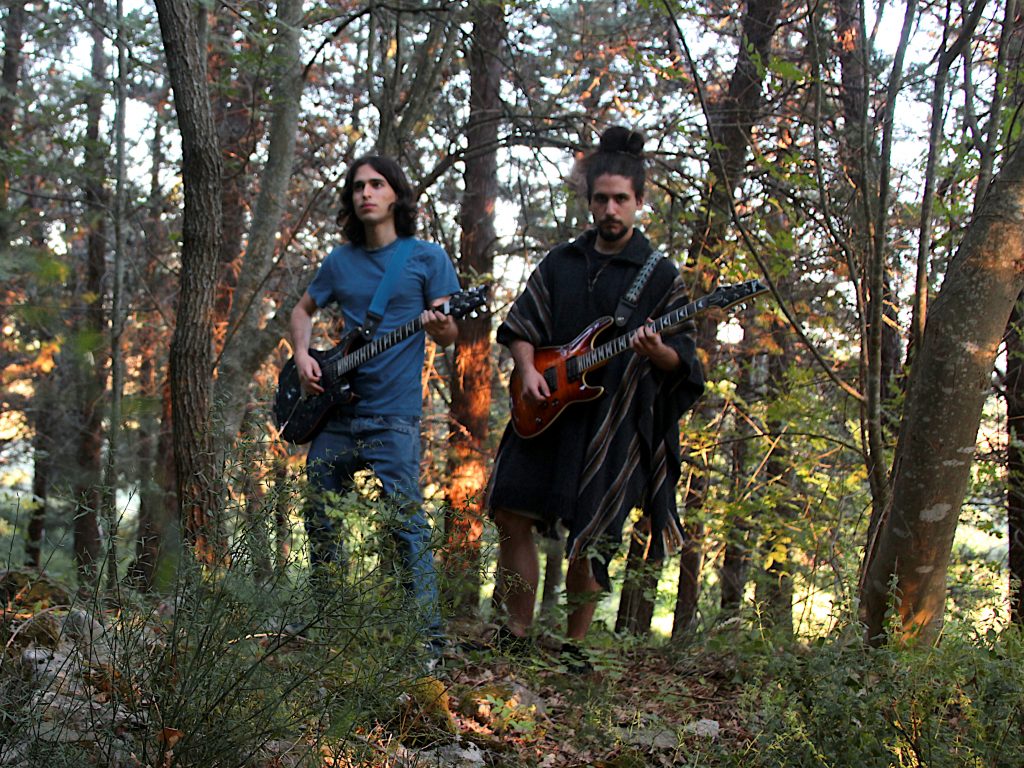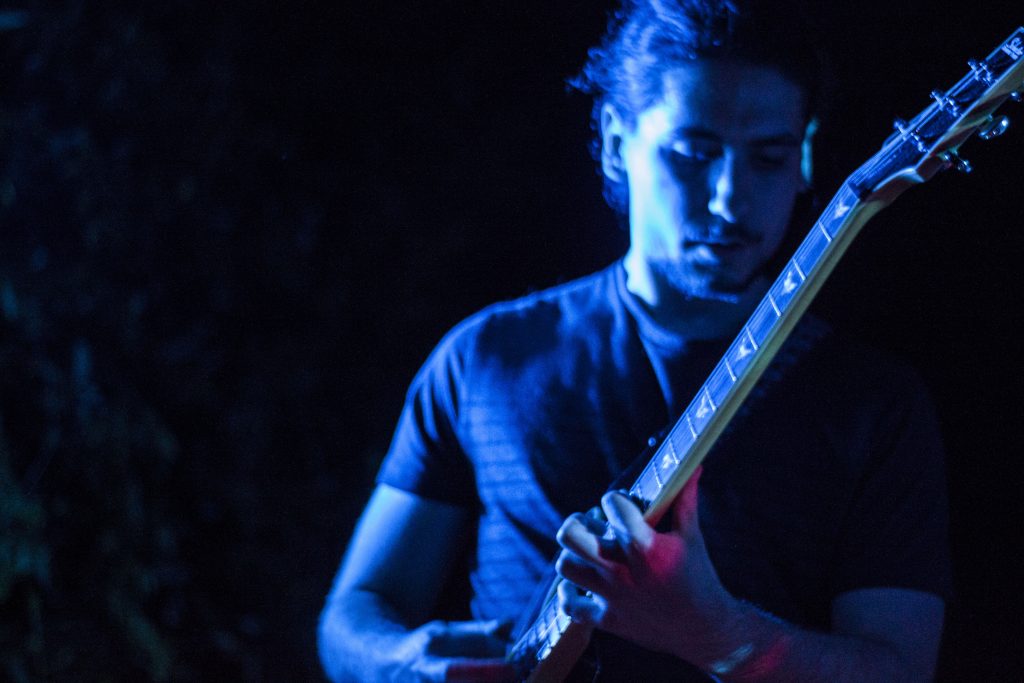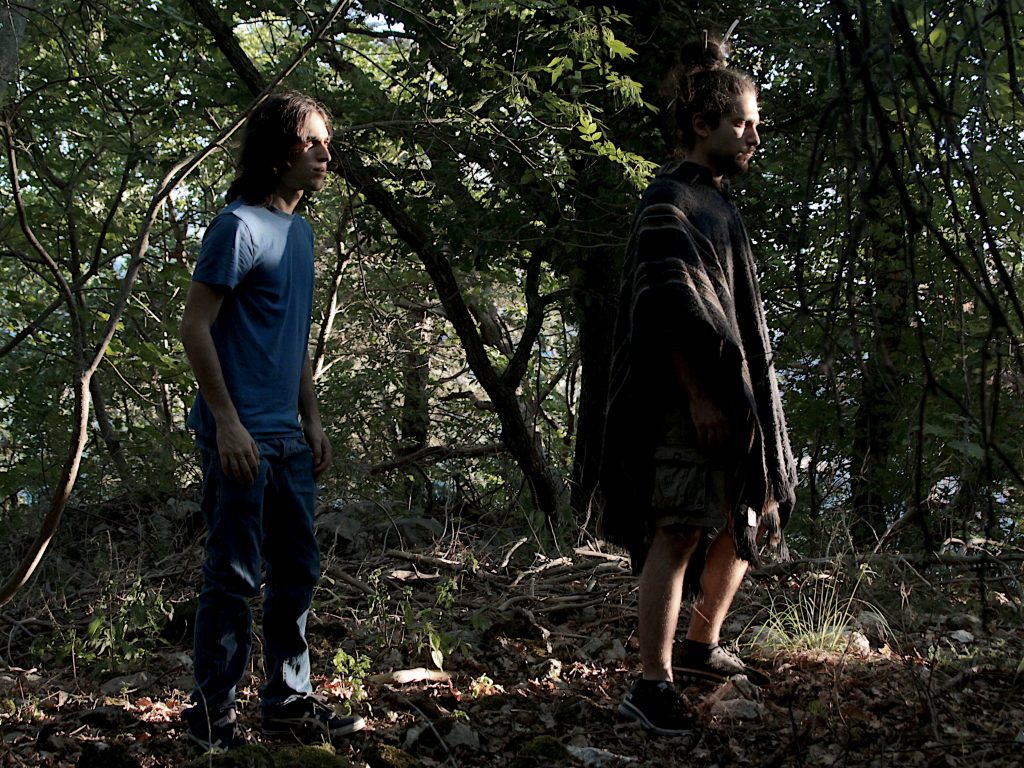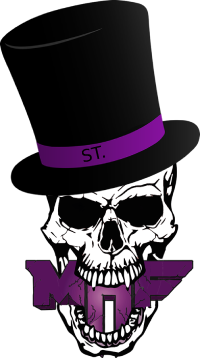What was the beginning pint for your music career? How did it all start?
My mother started teaching me how to play the piano when I was around five. When I was 16 I enrolled to a music school to study as a rock/jazz keyboardist, and I started thinking about creating a band. A few years later I picked up the bass and then the guitar, which I’ve learnt my myself and is the main instrument I play in my current band Arya, that I formed in 2015.
Was there any bumps on the road? What kind of challenges did you have to deal with?
There have been so many, when I look back at my experience as a musician I just seem to see failures, frustrations and lost opportunities. My first ever band dissolved for shame after a disastrous gig in front of a big audience, where my whole keyboard rig kept failing due to some issues with the electric supply from the venue. I’ve been in many bands since then, playing different genres and different instruments, but most of the times without achieving much: live music performed by bands is becoming less and less popular over the years here in Italy, and I feel like finding gigs and gathering an audience is becoming increasingly difficult. In 2018, lastly, Arya almost disintegrated shortly after our first international tour, doing so in an extremely obnoxious way we could have never predicted, and which has been extremely painful for me. We’re still trying to recover from that catastrophe, which is what our new album For Ever is about.
What was the most fulfilling and satisfying moment so far?
Probably our international tour of 2018, which brought us to Milan, Switzerland and Austria. I spent many months planning it carefully, and it was the coronation of a long pursued dream for me. If only I had known it was going to lead to the destruction of that line-up of the band…
How would you describe the music that you typically create?
I think describing our sound in a simple formula would be quite difficult: our songs usually feature big shifts in dynamics and unconventional structures; we like them to be unpredictable but also cohesive and coherent. We love contaminating genres and experimenting with unorthodox approaches, as we aim to create emotionally powerful music. We also like odd time signatures (if used with good taste). You could say we are a progressive metal band, but we’re far from the stereotypes that genre is known for. During the years we’ve incorporated elements from sludge, black and post metal, as well as alternative and indie rock, shoegaze and jazz.
What is your creative process like?
The way we’ve mainly worked so far on new songs begins with an idea, short or more articulated, that me or Simone, the other guitarist, bring to the table as a demo recording, usually as a single guitar part. Then we try to expand it into a full song, then all the band members create their parts around it, both on their own or together in the rehearsal room. For the new album, which has been composed entirely just by me and Simone, we worked a lot together in a room, recording ourselves, swapping, overlapping or cutting parts and trying all the crazy ideas we were having. For the first time we had an almost complete demo version of all our parts before recording them “officially”: before it was common for some of us to create their parts on the spot while we were recording the album.
We’ve also tried to compose songs from scratch in the rehearsal room together, but it’s always been difficult because we couldn’t see each other too often, as one or more of us always had to commute from another city, and you ended up losing a lot of time remembering what we had done two weeks before and arguing about minor details. We’ve even composed a few songs on the spot while we were recording an album, for example Landslide on our newest release For Ever.
As far as my contribution to songwriting goes, whenever I hear some music of any genre that surprises and hits me in some way, I try to grasp the essence of it in order to try to incorporate it into something mine: it may be a sound, a mood or a harmonic and rhythmic idea. Then, as me and the other members work on the song structure and each one provides new parts, the initial reference to each idea of the song gets lost, and probably the overall end result just ends up sounding like Arya.
If you could change anything about the industry, what would it be?
I think it would be hard to address a single issue, as most of them are originated from the fact that the few big players that already have a large amount of money to invest, aim to make the most profit out of it instead of caring about music in itself, which is the product they sell. This attitude has become way more radical since the money involved in the music business has drastically decreased as a result of the digital era. Big labels only care about making sure they get back all the money they invest, and they have enough resources (with the resulting power and influence) to almost monopolize the music market: they have the power to create trends, make them dominant and exploit them. It doesn’t matter what kind of music it is, what does it say or if it’s musically interesting and emotionally powerful or not. Whoever finds him or herself outside of this world is doomed only to aim to the crumbs they leave behind. However one could say: “Well, what’s wrong with that? They’re simply doing their job in the most efficient way, that’s how capitalism works”. And I agree: it’s really not specifically someone’s fault: today’s music industry is just the reflection of the insanely flawed society we all live in. People today want to be reassured and to be given simple certainties in order to keep living as they do, not doubts and critical thinking. We couldn’t really expect anything different from it.
If you were asked to give a piece of advice to upcoming bands, what would that be?
There’s already an insane amount of music coming out daily in the world: be careful on what you want to say with your songs, think about it. If you don’t, your popularity may only end up depending on your social media presence and on the money you spend to promote your “brand”. But if you want to be more of an advertising worker than an artist, there are safer and more remunerative ways to make a living out of it outside music.
What has been the best performance of your career so far?
Last summer, soon after the national lockdown was lifted, we managed to perform at a short films festival in a town called Cervia. Even if we were only performing a ten-minute composition made especially for that occasion, there was probably the biggest audience we’d ever had, even bigger than the one at the concert I told you above where all my rig had failed.
If you didn’t become a musician, what would you be doing now?
I’ve already done some things, as I can’t expect to make a living completely out of my music. I’ve graduated in philosophy and I can teach in schools, I’ve worked in a small packaging factory and I’m currently studying and doing some jobs as a sound editor and sound mixer in the movie industry, besides sometimes producing music by other artists.
What is new with the band at the moment? What are you currently working on and would like to share with the world?
We’ve just released a new album called For Ever, which is available on most streaming platforms and at https://werearya.bandcamp.com. We’re currently in the middle of the second wave of Covid here in Europe, and the restrictions enforced by the Italian government are making it hard for us even to see each other, as I’m currently in Rome, a different city from the rest of the band, and there are some restrictions on travelling. We’re slowly working on some new music and trying to fill the missing spot in our line-up: we’d like to be able to perform live again when it will be allowed, sometime next year.






